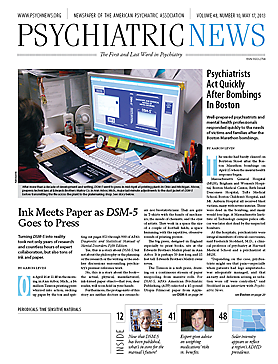People with serious mental illnesses, research has shown, are nearly twice as likely to be obese than the general American population. There might, however, be at least one solution to the challenging issue of how to reverse that situation in a group with often severe impairment, a new study suggests.
An answer might lie in an 18-month exercise and healthy-eating regimen offered to seriously mentally ill individuals who attend community psychiatric rehabilitation outpatient programs.
The study was headed by Gail Daumit, M.D., an associate professor of medicine at Johns Hopkins Medical Institutions. The results were published March 21 in the New England Journal of Medicine.
Daumit and her colleagues recruited some 300 seriously mentally ill individuals attending 10 community psychiatric rehabilitation outpatient programs in Maryland to participate in their study. Fifty-eight percent of them had schizophrenia or schizoaffective disorder, 22 percent had bipolar disorder, and 12 percent had major depression. Their average age was 48, and they were taking on average three psychotropic medications.
The subjects were randomized to an 18-month regimen of exercise and healthy eating through their psychiatric rehabilitation outpatient program or to 18 months of a control regimen.
The intervention was composed of group weight-management sessions, individual weight-management sessions, and group exercise sessions. The goals for the group included reducing caloric intake by avoiding sugar-sweetened beverages and junk food, eating five total servings of fruits and vegetables daily, choosing smaller portions and healthy snacks, and participating in moderate-intensity aerobic activity.
Trained members of the study staff led exercise classes for the first six months. After that, a trained member of the rehabilitation program staff offered exercise sessions using a video specifically prepared for this study.
Subjects in the group were also asked to monitor key behaviors with a simple tracking tool and to meet with the intervention staff to monitor their weight. The subjects were also given small reward items for attending sessions.
As for individuals in the control group, they received standard nutrition and physical-activity information at baseline, and health classes were offered to them quarterly, with content unrelated to weight issues—the information might discuss cancer screening, for example.
The subjects were weighed at baseline and at six, 12, and 18 months of follow-up.
At the end of 18 months, the group in the exercise and healthy eating program had lost a significant amount of weight—on average seven-and-a-half pounds. This was not the case for the control group. Those individuals had lost on average only one-half pound.
Although seven-and-a-half pounds may not seem like much, it is comparable to what the general American population achieves with similar lifestyle interventions, and research has shown that even such a modest loss can reduce cardiovascular disease risk, Daumit and her colleagues noted.
Moreover, “we were surprised to find that the intervention participants continued to lose weight after six months, while in weight-loss trials in the general population there is commonly weight regain after the first six months,” Daumit told Psychiatric News. “Persons with serious mental illness perhaps take longer to engage in the intervention than those without, but once they are engaged and make behavioral changes, it may be easier for them to maintain those behaviors during the rest of the intervention.”
The study did have several limitations, Joel Yager, M.D., a professor of psychiatry at the University of Colorado, chair of the APA Council on Research and Quality Care, and associate editor of Journal Watch for Psychiatry, noted in the April 8 issue of that publication. At the start of the study, the control subjects were using a higher average number of psychiatric medications than the intervention group, which might have affected weight loss. Moreover, the study did not track medication switches, which might have affected weight loss as well.
Nonetheless, “the study is, to my knowledge, the most robust demonstration to date of the potential effectiveness of lifestyle interventions regarding exercise and better eating on weight loss in patients with serious mental illness,” Yager told Psychiatric News.
The study has two take-home messages, he said. “First, psychiatric patients are at greater risk for obesity than the general population due to inactivity, poor diets, and the adverse metabolic effects of many second-generation antipsychotics and mood stabilizers we often prescribe. And second, although these strategies won’t work equally well for everyone, clinicians working with obese and overweight psychiatric patients should realize that helping to motivate, engage, and get their patients working with programs that systematically attend to diet and exercise should be considered core components of general psychiatric management these days.”
The study was funded by the National Institute of Mental Health. ■
